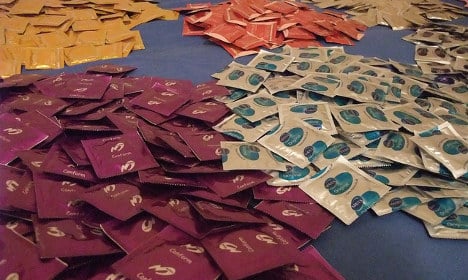The 'safe sex' packages contain condoms, lubricant, a toothbrush and toothpaste, as well as a leaflet with information about safe sex practice, Austrian newspaper Heute reported on Tuesday.
The leaflet has pictures of stick figures in sexual positions, to show how infections can occur.
“The take-care package, including information, is an important message about preventing infections, especially HIV and hepatitis B and C. Health is our priority,” a spokesperson for the Department of Justice, Britta Tichy-Martin, said, according to Heute.
The package will be available in 13 languages, including German, English, French, Arabic, Chinese and Swahili, reflecting the various nationalities of Austria's prison population.
Erection pills
In 2014 a whistleblower revealed that some long-term prisoners in Krems Stein prison in Lower Austria have been issued with 1000 Cialis-brand erectile-dysfunction drugs.
The story mentioned Cialis, which is prescribed as an erectile-dysfunction treatment, as an 'aphrodisiac', and expresses puzzlement at the motivation for the unusual clinical regime.
An employee received the order for 1000 doses of the 5 mg potency pills, which he found highly suspect. According to Heute, the employee explained that “We only carry out the arrangements of the medical management. Why long-term prisoners receive potency pills, is a matter solely for the chief physician to know.”
Christian Lausch, justice spokesman for the Austrian Freedom Party (FPÖ), called for an investigation into and an immediate halt of the distribution of the “potency treat.”
“The fact that the taxpayer has to pay for them, makes this scandal twice as bad”, he said.
Prison Facts
- 7 penal institutions for men – Stein, Graz-Karlau, Garsten, Suben, Sonnberg, Hirtenberg, Wien-Simmering
- 1 penal institution for adolescents – Gerasdorf
- 1 penal institutions for women – Schwarzau
- 3 institutions for involuntary detention (Maßnahmenvollzug) – Göllersdorf, Wien-Mittersteig, Wien-Favoriten
- 15 court institutions („gerichtliche Gefangenenhäuser“) – Eisenstadt, Wien-Josefstadt, Wr. Neustadt, St. Pölten, Krems, Korneuburg, Graz-Jakomini, Leoben, Klagenfurt, Linz, Wels, Ried i.I., Salzburg, Innsbruck, Feldkirch
- The Vienna juvenile court – Wiener Jugendgerichtshilfe



 Please whitelist us to continue reading.
Please whitelist us to continue reading.